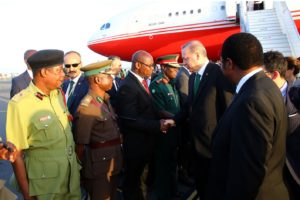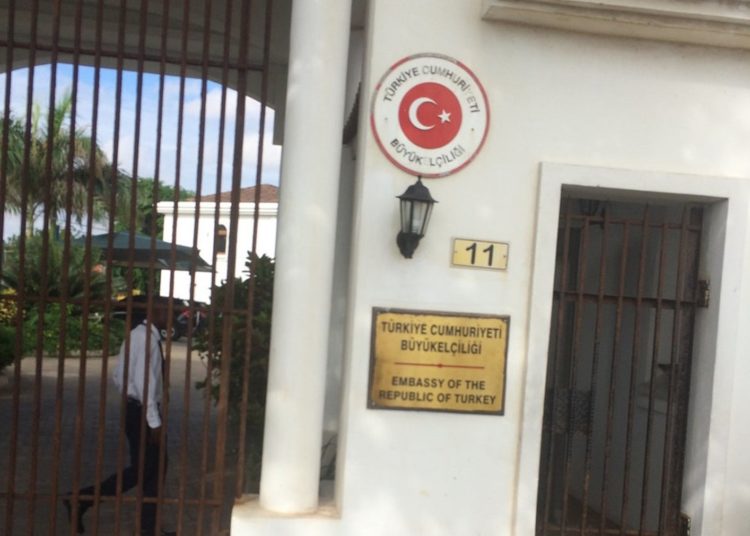Nordic Monitor/Stockholm
The arbitrary denial of consular services to critics of Turkish President Recep Tayyip Erdoğan not only deprived two Turkish nationals in Tanzania of their right to a passport but also prompted action by Turkey to seek their detention and extradition.
According to a Turkish police document, the embassy in Dar es Salaam was alerted when a Turkish couple affiliated with the Gülen movement, a group critical of Erdoğan, applied for renewal of their passports. The couple had been flagged by the Turkish Interior Ministry long before and their existing passports were cancelled by an administrative decision over their Gülen links.
The application was immediately transmitted to headquarters along with the couple’s residential address in Tanzania, which led Turkish authorities to seek ways and means to extradite them to Turkey.
The document, written by the head of the Interpol-Europol Department of the Turkish Police on October 20, 2017, annexed to a court case in Turkey and obtained by Nordic Monitor, asks whether the extradition of these persons would be requested or if Red Notices should be issued for them via Interpol.
Turkish police document revealing how the the Turkish embassy denied consular services to a couple critical of the Turkish president:
The abuse of Interpol mechanisms and bilateral agreements as a means of transnational repression has been a tool in the hands of President Erdoğan for continuing the persecution of his critics globally.
The document mentions a communique from the Ministry of Foreign Affairs October 10, 2017 and that refers to information obtained from the Turkish Embassy in Dar es Salaam. At the time, Turkish Ambassador Yasemin Eralp was leading the mission but was replaced by Ambassador Ali Davutoğlu in December 2017.
Eralp was the target of criticism in the pro-government media for not being effective and adamant enough to convince the local authorities to persecute Erdoğan critics living in Tanzania.
When President Erdoğan had traveled to Tanzania in January 2017 for a two-day official visit, where he met with his counterpart, John Magufuli, to discuss the closure or transfer of Gülen-affiliated schools to the the Turkish government-run Maarif Foundation, his efforts were not fruitful and Tanzanian authorities did not yield to his requests. The failure was blamed on the ambassador’s lackluster performance.

Two months after the visit, Ambassador Eralp was relieved of her position, outside of the regular schedule of diplomatic assignments. Eralp has not been appointed to another diplomatic post or noteworthy domestic position at the ministry ever since.
The jihadist-linked Maarif Foundation, a Turkish-government-funded entity, is educating nearly 30,000 students in 291 schools in 34 countries and is active in 55 countries worldwide with more schools planned to be launched. It employs 3,218 teachers, 206 of whom are Turkish nationals. The number of students enrolled in Maarif-run schools is listed as 28,703.
Maarif is branded as a pet project of Turkey’s Islamist President Erdoğan and serves as his regime’s long arm abroad in providing educational services as part of a proselyting campaign. It also aims to raise a new generation of political Islamist activists to mobilize around Erdoğan.
The Erdoğan government has been trying to pressure foreign governments to hand over schools affiliated with Erdogan’s arch-foe, Fethullah Gülen, to the Maarif Foundation. Gülen has revealed that he rejected Erdoğan’s demand to tap schools operated by businesspeople aligned with his movement for use in promoting the Turkish president’s political goals, which prompted the Turkish government to establish Maarif in order to compete with and take over Gülen schools.
The people who were informed on by the embassy are believed to be affiliated with the Gülen movement, critical of the Turkish government for a number of things, from rampant corruption in the administration to Erdogan’s aiding and abetting of armed jihadist groups in other countries.
Nordic Monitor has published many confidential Turkish government documents showing how the Turkish government has been spying on its own citizens globally with the help of its diplomatic missions. Diplomatic cables obtained contain information collected by these missions documenting spying activities, the unlawful and unwarranted cancellation of passports, the denial of regular consular services and the confiscation of valid documents.












